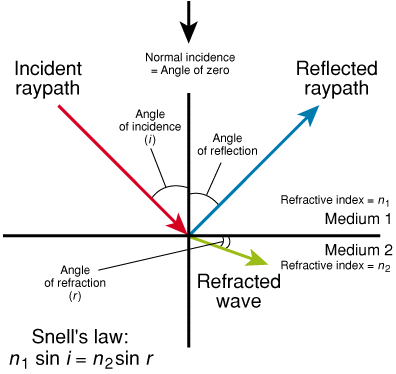1. n. []
The change in the direction of travel of a wavefront, or the bending of a ray, as it passes from one medium to another, expressed mathematically by Snell's law. Refraction is a consequence of changes in wavelength and velocity of propagation of a wave produced by differences in refractive indices of the media. Refraction surveys where the incident and reflected angles are critical can be useful for evaluating increasing velocity gradients and locating features that have anomalously high velocities, such as a salt dome within surrounding rocks of lower velocities.
Synonyms: seismic refraction method
See related terms: angle of approach, angle of incidence, blind zone, converted wave, critical angle, deep seismic sounding, displacement, Fermat's principle, head wave, reflection, refractive index, Snell's law, weathering correction
